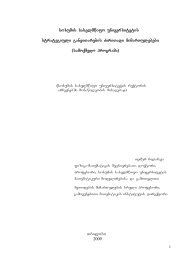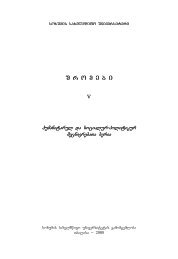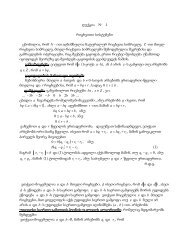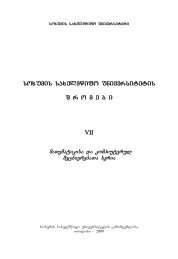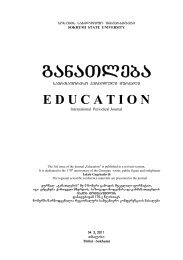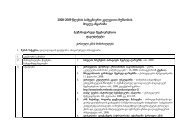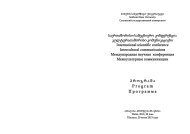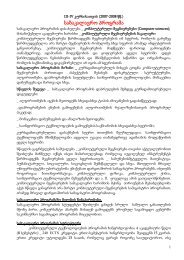- Page 1 and 2:
soxumis saxelmwifo universiteti iur
- Page 3 and 4:
Sokhumi State University Faculty of
- Page 5 and 6:
S i n a a r s i oTar gamyreliZe gur
- Page 7 and 8:
C O N T E N T S Otar Gamkrelidze Th
- Page 9 and 10:
soxumis saxelmwifo universiteti oTa
- Page 11 and 12:
soxumis saxelmwifo universiteti ar
- Page 13 and 14:
soxumis saxelmwifo universiteti da
- Page 15 and 16:
soxumis saxelmwifo universiteti naS
- Page 17 and 18:
soxumis saxelmwifo universiteti da
- Page 19 and 20:
soxumis saxelmwifo universiteti uka
- Page 21 and 22:
soxumis saxelmwifo universiteti lis
- Page 23 and 24:
soxumis saxelmwifo universiteti gur
- Page 25 and 26:
soxumis saxelmwifo universiteti dev
- Page 27 and 28:
soxumis saxelmwifo universiteti Si
- Page 29 and 30:
soxumis saxelmwifo universiteti erT
- Page 31 and 32:
soxumis saxelmwifo universiteti GUR
- Page 33 and 34:
soxumis saxelmwifo universiteti deb
- Page 35 and 36:
soxumis saxelmwifo universiteti yve
- Page 37 and 38:
soxumis saxelmwifo universiteti ode
- Page 39 and 40:
soxumis saxelmwifo universiteti viT
- Page 41 and 42:
soxumis saxelmwifo universiteti mie
- Page 43 and 44:
soxumis saxelmwifo universiteti Reb
- Page 45 and 46:
soxumis saxelmwifo universiteti mix
- Page 47 and 48:
soxumis saxelmwifo universiteti da
- Page 49 and 50:
soxumis saxelmwifo universiteti gam
- Page 51 and 52:
soxumis saxelmwifo universiteti sis
- Page 53 and 54:
soxumis saxelmwifo universiteti sis
- Page 55 and 56:
soxumis saxelmwifo universiteti roc
- Page 57 and 58:
soxumis saxelmwifo universiteti nil
- Page 59 and 60:
soxumis saxelmwifo universiteti MIK
- Page 61 and 62:
soxumis saxelmwifo universiteti mik
- Page 63 and 64:
soxumis saxelmwifo universiteti gaw
- Page 65 and 66:
soxumis saxelmwifo universiteti fes
- Page 67 and 68:
soxumis saxelmwifo universiteti tom
- Page 69 and 70:
soxumis saxelmwifo universiteti lie
- Page 71 and 72:
soxumis saxelmwifo universiteti im
- Page 73 and 74:
soxumis saxelmwifo universiteti tut
- Page 75 and 76:
soxumis saxelmwifo universiteti paa
- Page 77 and 78:
soxumis saxelmwifo universiteti saq
- Page 79 and 80:
soxumis saxelmwifo universiteti mis
- Page 81 and 82:
soxumis saxelmwifo universiteti lo
- Page 83 and 84:
soxumis saxelmwifo universiteti rus
- Page 85 and 86:
soxumis saxelmwifo universiteti rom
- Page 87 and 88:
soxumis saxelmwifo universiteti edi
- Page 89 and 90:
soxumis saxelmwifo universiteti mar
- Page 91 and 92:
soxumis saxelmwifo universiteti 1)
- Page 93 and 94:
soxumis saxelmwifo universiteti bis
- Page 95 and 96:
soxumis saxelmwifo universiteti pet
- Page 97 and 98:
soxumis saxelmwifo universiteti da
- Page 99 and 100:
soxumis saxelmwifo universiteti seb
- Page 101 and 102:
soxumis saxelmwifo universiteti str
- Page 103 and 104:
soxumis saxelmwifo universiteti kon
- Page 105 and 106:
soxumis saxelmwifo universiteti dan
- Page 107 and 108:
soxumis saxelmwifo universiteti irC
- Page 109 and 110:
soxumis saxelmwifo universiteti ALE
- Page 111 and 112:
soxumis saxelmwifo universiteti moc
- Page 113 and 114:
soxumis saxelmwifo universiteti di
- Page 115 and 116:
soxumis saxelmwifo universiteti qme
- Page 117 and 118:
soxumis saxelmwifo universiteti den
- Page 119 and 120:
soxumis saxelmwifo universiteti ixa
- Page 121 and 122:
soxumis saxelmwifo universiteti gim
- Page 123 and 124:
soxumis saxelmwifo universiteti sap
- Page 125 and 126:
soxumis saxelmwifo universiteti saq
- Page 127 and 128:
soxumis saxelmwifo universiteti mni
- Page 129 and 130:
soxumis saxelmwifo universiteti daz
- Page 131 and 132:
soxumis saxelmwifo universiteti nis
- Page 133 and 134:
soxumis saxelmwifo universiteti oSi
- Page 135 and 136:
soxumis saxelmwifo universiteti sib
- Page 137 and 138:
soxumis saxelmwifo universiteti cov
- Page 139 and 140:
soxumis saxelmwifo universiteti raS
- Page 141 and 142:
soxumis saxelmwifo universiteti sae
- Page 143 and 144: soxumis saxelmwifo universiteti ram
- Page 145 and 146: soxumis saxelmwifo universiteti Tav
- Page 147 and 148: soxumis saxelmwifo universiteti ara
- Page 149 and 150: soxumis saxelmwifo universiteti qeT
- Page 151 and 152: soxumis saxelmwifo universiteti cne
- Page 153 and 154: soxumis saxelmwifo universiteti rav
- Page 155 and 156: soxumis saxelmwifo universiteti des
- Page 157 and 158: soxumis saxelmwifo universiteti rom
- Page 159 and 160: soxumis saxelmwifo universiteti da
- Page 161 and 162: soxumis saxelmwifo universiteti KET
- Page 163 and 164: soxumis saxelmwifo universiteti xas
- Page 165 and 166: soxumis saxelmwifo universiteti eko
- Page 167 and 168: soxumis saxelmwifo universiteti ufr
- Page 169 and 170: soxumis saxelmwifo universiteti saj
- Page 171 and 172: soxumis saxelmwifo universiteti Tum
- Page 173 and 174: soxumis saxelmwifo universiteti asm
- Page 175 and 176: soxumis saxelmwifo universiteti laq
- Page 177 and 178: soxumis saxelmwifo universiteti ri
- Page 179 and 180: soxumis saxelmwifo universiteti ASM
- Page 181 and 182: soxumis saxelmwifo universiteti vla
- Page 183 and 184: soxumis saxelmwifo universiteti int
- Page 185 and 186: soxumis saxelmwifo universiteti bis
- Page 187 and 188: soxumis saxelmwifo universiteti neT
- Page 189 and 190: soxumis saxelmwifo universiteti mde
- Page 191 and 192: soxumis saxelmwifo universiteti li
- Page 193: soxumis saxelmwifo universiteti nis
- Page 197 and 198: soxumis saxelmwifo universiteti gen
- Page 199 and 200: soxumis saxelmwifo universiteti xeb
- Page 201 and 202: soxumis saxelmwifo universiteti 1)
- Page 203 and 204: soxumis saxelmwifo universiteti lal
- Page 205 and 206: soxumis saxelmwifo universiteti bas
- Page 207 and 208: soxumis saxelmwifo universiteti saT
- Page 209 and 210: soxumis saxelmwifo universiteti lob
- Page 211 and 212: soxumis saxelmwifo universiteti nic
- Page 213 and 214: soxumis saxelmwifo universiteti ety
- Page 215 and 216: soxumis saxelmwifo universiteti jan
- Page 217 and 218: soxumis saxelmwifo universiteti ul
- Page 219 and 220: soxumis saxelmwifo universiteti axl
- Page 221 and 222: soxumis saxelmwifo universiteti kiT
- Page 223 and 224: soxumis saxelmwifo universiteti vis
- Page 225 and 226: soxumis saxelmwifo universiteti JAN
- Page 227 and 228: soxumis saxelmwifo universiteti TaS
- Page 229 and 230: soxumis saxelmwifo universiteti dax
- Page 231 and 232: soxumis saxelmwifo universiteti dae
- Page 233 and 234: soxumis saxelmwifo universiteti qar
- Page 235 and 236: soxumis saxelmwifo universiteti biT
- Page 237 and 238: soxumis saxelmwifo universiteti azr
- Page 239 and 240: soxumis saxelmwifo universiteti deg
- Page 241 and 242: soxumis saxelmwifo universiteti Sic
- Page 243 and 244: soxumis saxelmwifo universiteti mia
- Page 245 and 246:
soxumis saxelmwifo universiteti saz
- Page 247 and 248:
soxumis saxelmwifo universiteti gad
- Page 249 and 250:
soxumis saxelmwifo universiteti mos
- Page 251 and 252:
soxumis saxelmwifo universiteti tiu
- Page 253 and 254:
soxumis saxelmwifo universiteti leb
- Page 255 and 256:
soxumis saxelmwifo universiteti pre
- Page 257 and 258:
soxumis saxelmwifo universiteti tri
- Page 259 and 260:
soxumis saxelmwifo universiteti beg
- Page 261 and 262:
avtorebi oTar gamyreliZe — iuridi
- Page 263 and 264:
A U T H O R S Otar Gamkrelidze - Do



